Medical expert of the article
New publications
Preparations
Arrhythmia pills
Last reviewed: 23.04.2024

All iLive content is medically reviewed or fact checked to ensure as much factual accuracy as possible.
We have strict sourcing guidelines and only link to reputable media sites, academic research institutions and, whenever possible, medically peer reviewed studies. Note that the numbers in parentheses ([1], [2], etc.) are clickable links to these studies.
If you feel that any of our content is inaccurate, out-of-date, or otherwise questionable, please select it and press Ctrl + Enter.
Indications of the arrhythmia tablets
Tablets from arrhythmia can be prescribed only by a cardiologist after the patient has undergone a complete examination. This disease, first of all, is treated with popular medications, although therapy should also include a special diet. In some cases, treatment with pills helps to completely get rid of arrhythmia, but more often they are just a preparatory stage to more serious therapies.
In what cases can a doctor prescribe a pill? If the patient has the following symptoms:
- Feeling of a heart flutter in the chest without a special reason.
- Pain and heart palpitations can find periods.
- The rhythm of the heart can in some cases be slowed down.
- Pain in the chest.
- Fatigue, shortness of breath.
Release form
Drugs for arrhythmia can be divided into four main groups:
- Beta-blocker
- Calcium channel blocker: prevents the penetration of calcium ions into the cell.
- Potassium channel blocker.
- The blocker of sodium channels.
Most often, with arrhythmia, such pills are used:
- Concor.
- Anaprilin.
- Egilok.
- Metoprolol.
- Bisoprolol.
- Verapamine.
- Amlodipine.
- Amlodak.
- Amiodarone.
- Cordaron.
- XYCain.
- Mexiletin.
Concor
Tablets, which contain the active substance bisoprolol hemifumag. The drug is often used not only to treat arrhythmia, but also as a therapy for stable angina, hypertension and chronic heart failure.
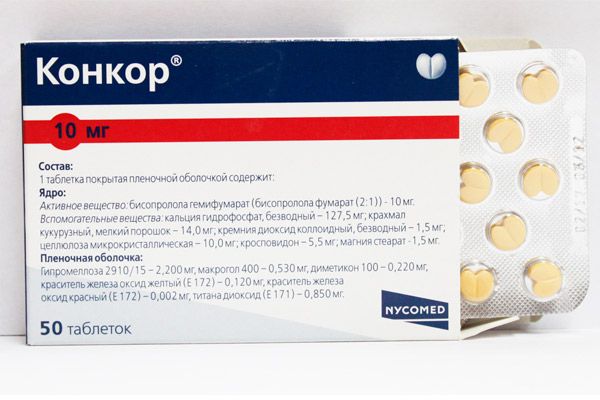
Take one tablet once a day with plenty of fluids. Reception can be carried out both on an empty stomach and after eating. As a rule, therapy is quite long.
Patients with acute heart failure, sinoatrial blockade, bradycardia, low blood pressure, bronchial asthma, Raynaud's disease, pheochromocytoma, metabolic acidosis and bisoprolol hemifumag intolerance are not allowed to take Concor tablets. Also, they are contraindicated to persons under the age of eighteen.
Quite often, the following symptoms are seen in patients after receiving Concor: dizziness, bradycardia, headaches, numbness of limbs, loss of consciousness, sleep disorders, depression, vomiting, nausea, diarrhea, muscle cramps, asthenia, allergies.
Anaprilin
A popular anti-arrhythmic non-selective beta-blocker, which has antianginal, antihypertensive, antiarrhythmic effects. As part of the drug-propranolol. Dosage is prescribed by the attending physician individually, based on the severity of the disease and the patient's condition. But the single dose should not exceed 80 mg of the drug. It is very important to break the reception two or three times a day.
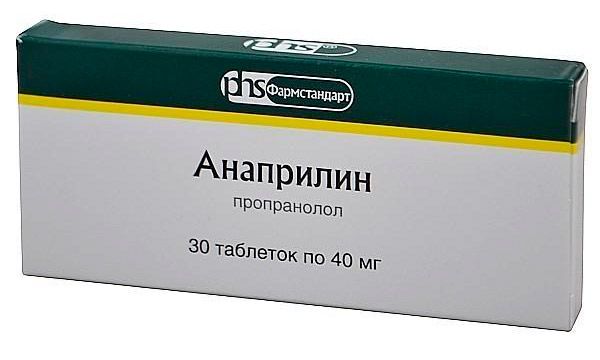
Patients with sinoatrial blockade, AV blockade of the second and third degree, bradycardia, chronic heart failure, cardiogenic shock, intolerance to propranolol, tablets are not allowed.
In some patients, the use of Anaprilin is accompanied by the appearance of the following symptoms: weakness, fatigue, insomnia, nervousness, depression, dry eye, vomiting, diarrhea, taste changes, bronchospasm, thrombocytopenia, allergy.
Egilok
Popular tablets from arrhythmia, in which the active substance of metoprolol tartrate acts.
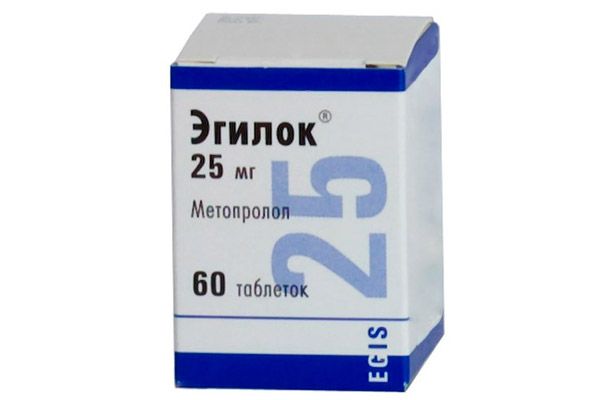
Take during or after meals. If necessary, the tablet can be broken to drink half the dose. Dosage is selected individually by the attending physician to avoid the possibility of the patient developing a bradycardia. Do not take more than the maximum daily dose (200 mg).
Patients with cardiogenic shock, sinoatrial blockade, bronchial asthma, bradycardia, pheochromocytoma, intolerance to metoprolol should not be taken. Clinical data on the effect of funds for patients under 18 years of age do not.
As a rule, Egilok tablets are transferred by patients quite well. Unpleasant symptoms from reception are expressed extremely rarely. Sometimes patients experience severe fatigue, bradycardia, parestenzia, anxiety, dyspnea, nausea, allergies, decreased sexual desire, arthralgia.
 [17]
[17]
Metoprolol
A popular beta-blocker, which includes the active substance metoprolol tartrate. It is prescribed for the therapy of arrhythmia, coronary heart disease, arterial hypertension, hyperthyroidism, as well as for the prevention of migraine.
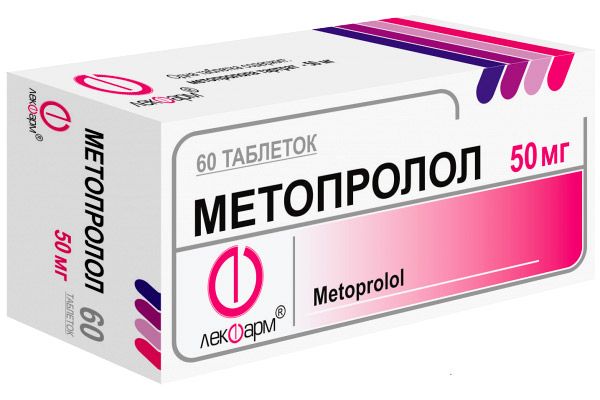
Metoprolol tablets are taken during or after a meal. It is recommended to drink the product with a sufficient amount of water. First, patients are prescribed 1-2 tablets twice a day, if there is no therapeutic effect, the dose is increased. Do not exceed the established maximum daily dose (200 mg).
Patients with cardiogenic shock, bradycardia, weak sinus node syndrome, heart failure, Prinzmetal angina, hypertension, metoprolol intolerance to take tablets are prohibited. They are also contraindicated in patients under the age of 18 and breastfeeding women.
The appearance of unpleasant symptoms during the use of metoprolol is associated with the individual sensitivity of each patient. Sometimes there may be: tinnitus, blurred vision, weakness, depression, worsening of attention, conjunctivitis, vomiting, abdominal pain, headaches, allergies.
Bisoprolol
A popular drug against arrhythmia, which includes bisoprolol fumarate. It is also used to treat angina pectoris, especially during seizures.
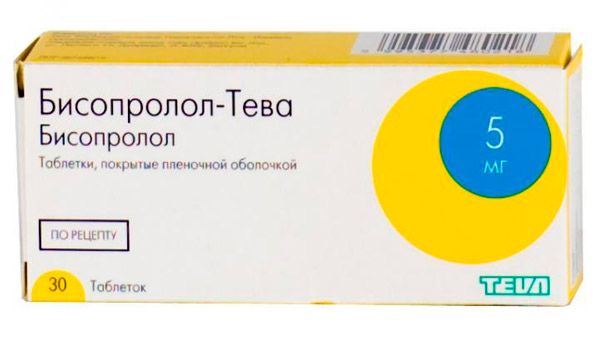
The initial dose of Bisoprolol is 5 mg in 24 hours. In this case, the tablet should be taken before breakfast, with plenty of liquid. If necessary, the attending physician may increase the daily dose to 10 mg.
Patients with cardiogenic shock, collapse, pulmonary edema, chronic heart failure, sinoatrial blockade, bradycardia, prinzmetal angina, cardiomegaly, bronchial asthma, metabolic acidosis, intolerance to bisoprolol to take tablets is prohibited.
Quite often after taking bisoprolol, patients develop diarrhea, headaches, develop insomnia, depression, weakness and fatigue, conjunctivitis, pain in the chest, liver and kidney problems, hyperglycemia, allergies, fetal bradycardia, fetal development delay, increased sweating .
Verapamil
A popular blocker of calcium channels, which contains the active substance verapamine hydrochloride. Has antihypertensive, antiarrhythmic and antianginal effect. Reduces the need for myocardium in oxygen.

Dosage and duration of treatment are appointed individually by the attending physician. Often the drug is used as a preventive measure of arrhythmia and angina. In this case, patients are prescribed 80 mg of the drug three times a day.
Patients with cardiogenic shock, bradycardia, weak sinus node syndrome, Morgagni-Adams-Stokes syndrome, Wolff-Parkinson-White syndrome, heart failure and intolerance to verapamine are not allowed to take the drug. Rarely, the following uncomfortable symptoms can appear in patients after receiving verapamil tablets: headaches, dizziness, vomiting, nausea, redness of the face, bradycardia, constipation, allergies, peripheral edema.
Amlodipine
A popular drug from the group of calcium channel blockers. The active ingredient is amlodipine in the form of besylate, which is 10 mg in one tablet.
Are taken on an empty stomach or after a meal. First dose is 5 mg of the drug every 24 hours. Within seven to fourteen days, the dose is gradually increased to 10 mg per day. Do not exceed the maximum daily dose (10 mg).
Patients with collapse, bradycardia, unstable angina, hypertension, amlodipine intolerance, take the drug is contraindicated. Also, this drug is prohibited for patients under 18 and pregnant women.
Quite often after taking the drug, patients experience side effects: dizziness, increased palpitations, headaches, swelling, abdominal pain, nausea, tachycardia, pollakiuria, arthralgia, xeroderma, allergies, conjunctivitis.
Amlodak
A drug from the group of selective calcium channel blockers. In the Amlodak tablets, a substance derived from dihydropyridine can be found.
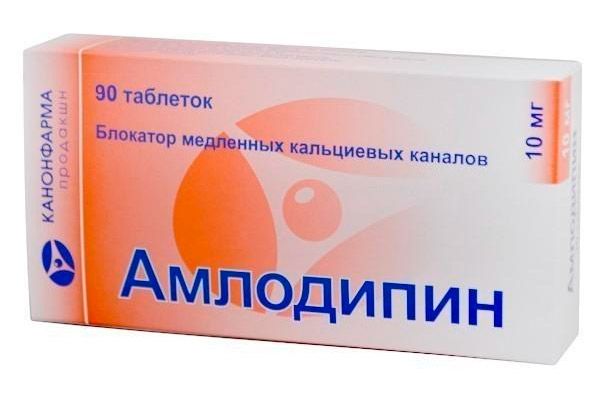
In the initial stages of therapy, the attending physician, as a rule, prescribes a minimum dose of 5 mg once a day. Within a week, the dose increases to 10 mg per day. Do not exceed the maximum possible daily dose of 10 mg.
Patients with dihydropyridine intolerance and well-defined arterial hypertension Amlodak tablets can not be taken. It has not been established whether the drug is safe for use during pregnancy and lactation.
In some patients, the medication can lead to the following side effects: headaches, peripheral edema, drowsiness, excessive fatigue, arrhythmia, dyspnea, skin hyperemia, paresthesia, allergies, pain in the extremities.
 [27],
[27],
Amiodarone
A popular antiarrhythmic drug, in which you can find the active substance amiodarone hydrochloride. The drug is an inhibitor of repolarization. It also has a well-pronounced coronarodilating, antianginal and thyrotropic action.
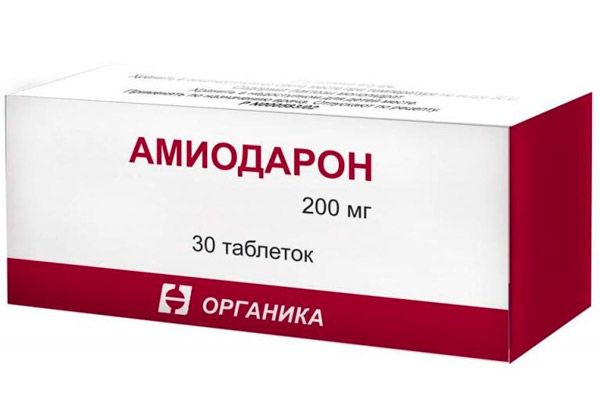
As a rule, it is prescribed for therapy of ventricular arrhythmia of severe severity, as well as supraventical and atrial fibrillation. The dose and duration of treatment are established, and also adjusted (if necessary) by a specialist. Tablets are taken before or after meals, with plenty of liquid.
Tablets Amiodarone have a lot of contraindications, which should be carefully studied before taking the drug. Patients with weak sinus node syndrome, atrioventicular blockade, hypertension, hyper- and hypothyroidism, hypokalemia, hypomagnesemia, interstitial lung diseases, intolerance to amiodarone, lactose or iodine should not be taken completely. Also, it can not be used to treat patients who are under 18 years of age. Pregnant women are not accepted, since the drug contains iodine.
Often, patients who take Amiodarone may experience side effects: mild bradycardia, vomiting, flavors, acute toxic hepatitis, pneumonitis, acute respiratory syndrome with fatal outcome), photosensitivity, tremor, allergy.
Kordaron
In the composition of the drug with antiarrhythmic action - active substance amiodarone hydrochloride. The drug is taken only as directed by a specialist. In this case, the dosage and duration of therapy are individual. There is a loading and maintenance dose. Do not exceed the maximum possible daily dose of 400 mg.
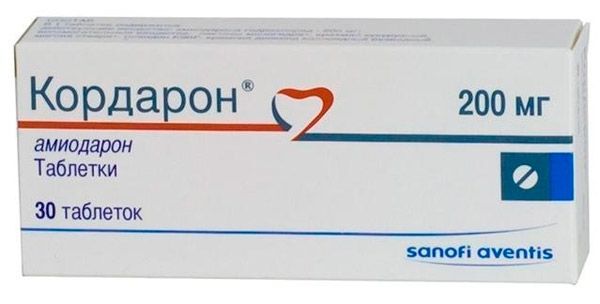
Patients with hypomagnesemia, hypokalemia, sinus bradycardia, thyroid dysfunction, interstitial lung diseases, intolerance to iodine, amiodarone or lactose should not be used. Also, it should not be taken to patients under 18 years of age, during pregnancy and lactation.
Very often, patients who take Cordarone tablets from arrhythmia may experience the following side effects: bradycardia, dysgeusia, vomiting, chronic liver disease (sometimes fatal), bronchospasm, hypothyroidism, photosensitivity, epididymitis, Quincke's edema.
Mexiletin
By its chemical structure, this drug is similar in its pharmacological characteristics to lidocaine. It is a popular antiarrhythmic drug that is included in the IB class. It is used to treat various disorders in the heart rhythm.
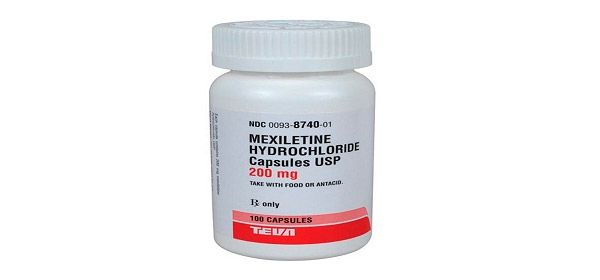
First, the drug is used in the form of injections. After receiving the necessary therapeutic effect, Mexiletine pills are switched to tablets. They are swallowed whole, with enough water. First, take two tablets (400 mg) once every six to eight hours, after improving the condition of the patient, the dose is reduced to one tablet every six to eight hours.
Patients with weakness sinus node, bradycardia, hypotension, heart failure, hepatic or renal insufficiency, intolerance mexiletine can not take tablets. Not prescribed for pregnant women and nursing.
With long-term admission Mexiletina, some patients change their taste, nystagmus, vomiting, disorders of spiciness, ataxia, paresthesia, tremor, confusion, drowsiness, allergies.
Tablets from atrial fibrillation
One of the most popular drugs for the treatment of atrial fibrillation are quinidine tablets. They have a pronounced antiarrhythmic effect.
For the treatment of adult patients, a minimum dose (not more than 0.3 g) is first prescribed. This will reveal how much the patient's body is sensitive to the substance of quinidine. If necessary, the dose can be increased to 0.4 g once every six hours. If no therapeutic effect was achieved, add 0.2 g of the drug every 60 minutes, until the paroxysmal ceases.
To treat frequent attacks of ventricular arrhythmia, it is necessary to take quinidine tablets at 0.4 g every three hours.
Patients with thrombocytopenic purpura, hypersensitivity, glycosidic intoxication, cardiogenic shock, myasthenia gravis take quinidine is prohibited. Pregnant and breast-feeding women use extremely cautiously.
When taking the drug, the following symptoms can occur: headaches, ringing in the ears, dizziness, hemolytic anemia, poor appetite, vomiting, constipation, diarrhea, sinus bradycardia, quinidine shock, allergy.
Tablets from sinus arrhythmia
Sinus arrhythmia is a disease that almost always occurs asymptomatically. If this type of arrhythmia is not combined with another, more serious type, a rhythm disorder, then treatment is not required. In some cases, the cardiologist may prescribe a therapy based on the taking of sedative medications. As a rule, tablets from sinus arrhythmia-drugs based on plant extracts.
If the vagotonia is strongly pronounced, the patient can take Sulfate atropine. The standard dose is 300 mg every four to six hours. If the patient suffers from glaucoma and obstructive diseases of the gastrointestinal tract, atropine sulfate is contraindicated. In the course of treatment, the following side effects may occur: sensation of dryness in the oral cavity, mydriasis, palpitation, difficulty urinating, atonic constipation, vertigo, headaches. Tablets from high blood pressure for arrhythmia
If the patient has an arrythmia accompanied by high blood pressure, complications can develop in the form of development of myocardial ischemia, negative neurologic. It is very important to reduce the pressure during arrhythmia. The following tablets are used for this:
- Hydrochlorothiazide - Each tablet contains 25 mg of hydrochlorothiazide. Take one or two tablets once every 24 hours. Patients with hypertension, edematous syndrome, glaucoma, diabetes insipidus are not admitted. Tablets can disrupt electrolyte balance, lead to headaches, drowsiness, dizziness, paresthesia and allergies.
- Indapamide is a popular diuretic. Take the best in the morning on an empty stomach, with plenty of liquid. Do not exceed the maximum dose - 1 tablet for 24 hours. Do not take patients with galactosemia, kidney failure, hypokalemia, encephalopathy, intolerance to lactose, during pregnancy. Reception can cause nausea, headaches, nocturia, pharyngitis, anorexia, loss of appetite, allergies.
Pharmacodynamics
Consider the pharmacodynamics and pharmacokinetics of tablets against arrhythmia using the example of the popular drug "Concor".
It is a selective beta 1-adrenoblocker. It differs membrane-stabilizing effect and negative inotropic action. After taking Concor Pills, they help reduce the frequency of heart contraction, reduce its stroke volume, and reduce the fraction of the left ventricular ejection. The maximum therapeutic effect is observed in three to four hours after administration.
Pharmacokinetics
Immediately after taking bisoprolol, which is a part of Concor, completely (90%) is absorbed from the stomach. 30% of the substance binds to plasma proteins. Metabolites are excreted by the kidneys. 50% of bisoprolol is excreted unchanged through the kidneys. The remaining 50% is metabolized in the liver.
Use of the arrhythmia tablets during pregnancy
For the treatment of pregnant women, pills from arrhythmia are used extremely rarely and only under close supervision of the treating obstetrician-gynecologist. If the composition of the drug includes iodine, use during pregnancy is completely prohibited, as this can harm the development of the fetus. When using tablets from arrhythmia, you must constantly monitor blood flow in the placenta. If a negative effect on the fetus is seen, alternative therapeutic measures should be taken.
Contraindications
- Heart failure (in acute form).
- Cardiogenic shock.
- The stage of decompensation of chronic heart failure.
- Sinoatrial blockade.
- Low blood pressure.
- Bradycardia.
- Bronchial asthma (in severe form).
- Pheochromocytoma.
- Patients under 18 years.
- Metabolic acidosis.
- Intolerance of components.
Overdose
Most often, with an overdose of pills from arrhythmia, patients have the following symptoms: bradycardia, increased blood pressure, bronchospasm, cardiac insufficiency in acute form, hypoglycemia. For treatment, you must immediately stop taking the drug and begin a special therapy (appoints a specialist).
Interactions with other drugs
The tolerability and effectiveness of tablets from arrhythmia can be influenced by other medications. Among the most popular non-recommended combinations are:
- Arrhythmic drugs that enter the first class (dysopyramide, quinidine, flecainide, propafenone) can worsen the work of the heart.
- Diltiazem together with Concor may lead to a worsening of AV conductivity.
- Together with MAO inhibitors, the antihypertensive effect of blockers can be enhanced.
Attention!
To simplify the perception of information, this instruction for use of the drug "Arrhythmia pills" translated and presented in a special form on the basis of the official instructions for medical use of the drug. Before use read the annotation that came directly to medicines.
Description provided for informational purposes and is not a guide to self-healing. The need for this drug, the purpose of the treatment regimen, methods and dose of the drug is determined solely by the attending physician. Self-medication is dangerous for your health.

